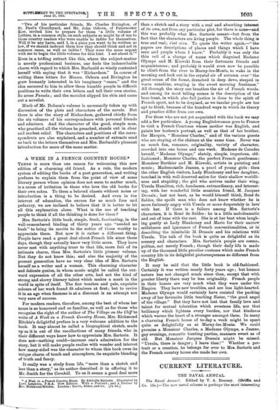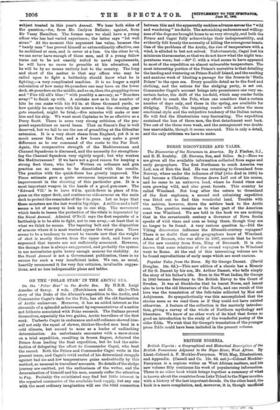C URRENT LITERATURE.
THE NAVAL ANNUAL.
The Naval Annual. Edited by T. A. Brassey. ((Giffin and Co. 15s.)—The uew naval scheme is perhaps the most interesting subject treated in this year's Annual. We hear both sides of the question,----for, from Mr. Carlyon Bellaire; against, from Sir Vesey Hamilton. The former says we shall have a young officer who has had varied experience; the latter says "let well alone." At the moment this argument has value, because the " handy man " has proved himself so extraordinarily effective, can be mobilised at once, and is never at a loss. On the other hand, we can never have enough of these men, and if a young fellow turns out to be not exactly suited to naval requirements, he will have no cause to grumble at his education, and he will be by no means entirely lost to the country. The long and short of the matter is that any officer who may be called upon to fight a battleship should know what he is fighting,—a very complicated machine. It is no longer a rapid calculation of how many 64-pounders one may have on the lower deck, 48-pounders on the middle, and so on, then the grappling-irons and "Fire till all's blue !" with possibly a savoury, as " Boarders away!" to finish up with. A mistake now as to the number of hits he can make with his 9'2 in. at three thousand yards, or how quickly he can turn with his screws when the steering gear gets smashed, might be fatal, —five minutes will make or mar him and his ship. We want most Captains to be as effective as a Percy Scott. There is some very strong criticism of the pro- posed expenditure on naval bases. That on Simon's Bay is well deserved, but we fail to see the use of grumbling at the Gibraltar extension. It is a very short steam from England, yet it is so much nearer the East, and a few hours may make a great difference as to our command of the route to the Far East. Again, the comparative strength of the Mediterranean and Channel Squadrons is discussed, and the necessity for strengthen- ing the Channel Squadron very rightly urged ; but why weaken the Mediterranean? If we have not a good reason for keeping a strong fleet there, who has ? Writers on ordnance and gun practice see no reason to be dissatisfied with the results. The practice with the quick-firers has greatly improved. The Times estimate gave a quite erroneous impression as to the improvement in the shooting of this particular gun. It is a most important weapon in the hands of a good gun-crew. The Edward VII.' is to have 9.2 in. quick-firers in place of 6 in. guns on the upper deck, and continuous side-armour on the main deck to protect the remainder of the 6 in. guns. Let us hope that these monsters are the last word in big ships. A million and a half seems a lot of money to lock up in one ship. The movement which tends to lessen the protection of the vitals is deprecated by the Naval Annual. Admiral O'Neill says the first requisite of a battleship is to be able to fight, not to run away,—at least that is what we think he means. The tapering belt and the disposition of armour where it is most wanted appear the wiser plan. There seems to be a tendency to revert to turrets now that the weight of shot is mostly thrown from the upper deck, and fears are expressed that turrets are not sufficiently armoured. However, the damage done is always exaggerated, and probably the system in use necessitates quite heavy enough armour for stability. As the Naval Annual is not a Government publication, there is no excuse for such a very insufficient index. We can, as usual, heartily recommend it for very fair criticism, invaluable sugges- tions, and no less indispensable plans and tables.























































 Previous page
Previous page